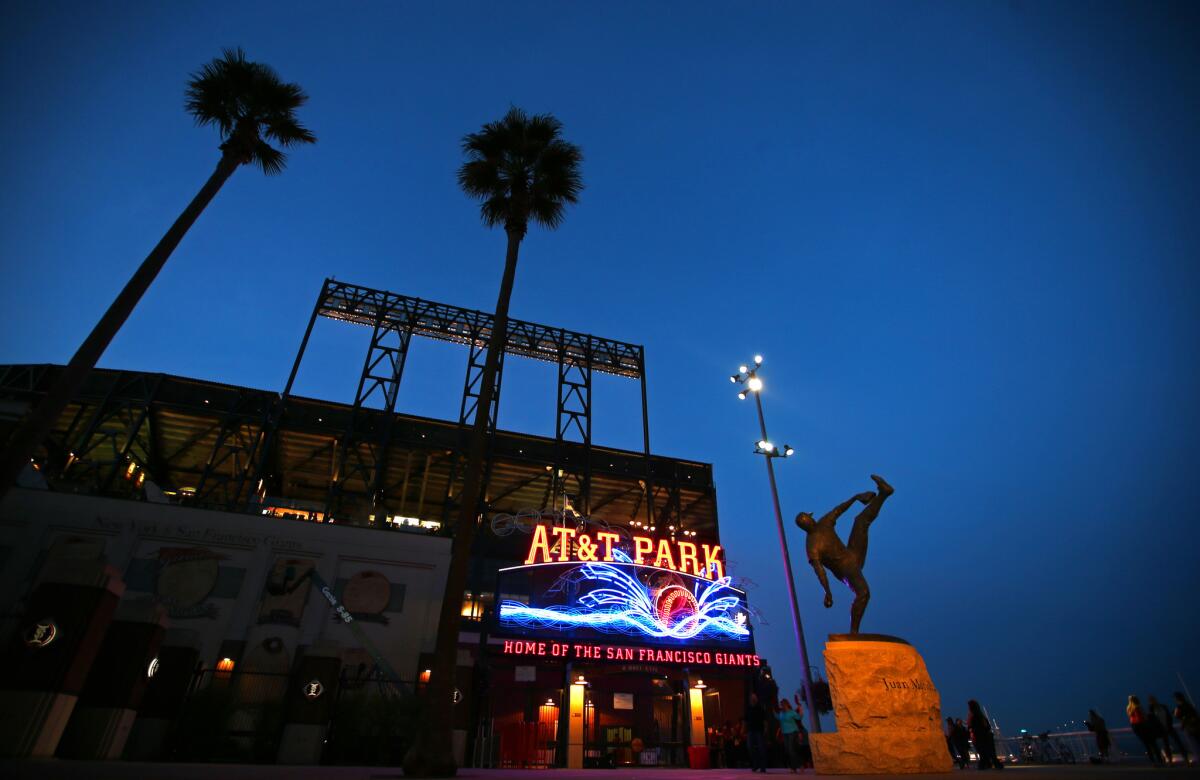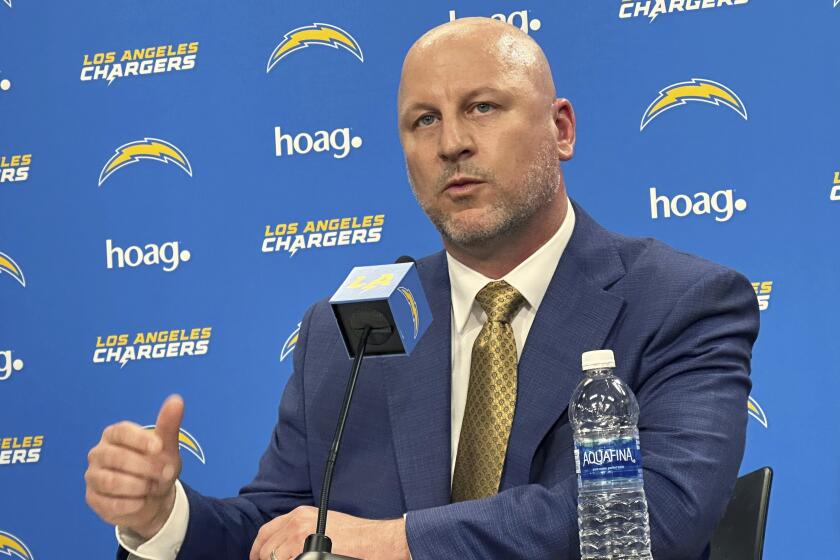Dodgers could learn from San Francisco Giants’ Mission Rock proposal

On Tuesday, San Francisco voters will be asked to waive a law restricting the height of waterfront structures so the Giants can build a neighborhood of homes, shops and more adjacent to AT&T Park.
The Dodgers had the highest payroll in baseball. You might have heard that, say, 300 million times this season.
The team with the second-highest payroll in the National League?
Buster Posey, the San Francisco Giants’ star catcher, was stumped. He paused a few seconds, then took a guess.
“Would it be us?” he said.
Yes, it would.
For all the money the Dodgers spend, the Giants are right behind them, with hardly anyone saying a word about it.
“We kind of like that,” team President Larry Baer said.
And for all the years of talk about how the Dodgers could make millions by developing the parking lots around their stadium, the Giants are set to do just that.
On Tuesday, San Francisco voters will be asked to waive a law restricting the height of waterfront structures so the Giants can build a neighborhood of homes, shops, offices, art studios, parks and a brewery adjacent to AT&T Park.
“It’s going to have a Fenway feel, a Wrigleyville feel,” Baer said, “that further cements it as an iconic San Francisco place.”
The so-called Mission Rock proposal — refined over eight years of negotiations with city leaders and community activists — has generated no organized opposition, based on campaign finance reports filed with the city’s Ethics Commission.
The Giants already generate more revenue than any other team in baseball except the Dodgers and New York Yankees, according to Forbes estimates. In two years, when the Giants have paid off the debt on their ballpark and the revenue starts flowing from Mission Rock, the team stands to add tens of millions to its coffers every year.
“The biggest single thing for us going forward is that we have a real estate project,” Baer said, “that is going to help us create a very important neighborhood around the ballpark and allow us to keep up with teams that are in larger markets.
“We can’t convert to 18 million homes for television like New York has, or 12 million homes like L.A. has. We’re at 7 million homes. To make up for the disparity, that is going to be one difference-maker for us.”
The Giants have won the World Series three times in six years, and they have announced 408 consecutive sellouts. Demand is so high that the Giants adjust ticket prices by the minute, and Baer said they can make almost $2 million more on a Sunday sellout against the Dodgers than a Tuesday sellout against . . . “well, I don’t want to pick on any teams, but somebody who is not the Dodgers.”
What the Mission Rock development might represent most of all is a margin for error — a hedge against the days when the Giants do not win in every even-numbered year and do not sell every available ticket.
“When season-ticket holder defections start, that could be the beginning of a scary business downturn,” Baer said. “We don’t want to ever encounter that.”
Although the Giants sold every ticket this season, they still sold 400,000 fewer tickets than the Dodgers, the team with the largest stadium in baseball. And although the Giants spent more than any NL team but the Dodgers on payroll, they still spent $100 million less than the Dodgers.
Baer said he senses a “trust factor” among players and fans. This is not the kind of ownership that is likely to be persuaded to outbid all comers for Zack Greinke, though the Mission Rock money might tempt them to do so. This is a club buoyed by three parades, consistency in management, a home-grown infield, and the retention of such popular players as Posey, Madison Bumgarner, Matt Cain, Tim Lincecum and Hunter Pence.
“If you sign your own guys, there’s less angst,” Baer said, “because these are guys that you have seen deliver rings.”
When Baer was asked if he had taken pride in absorbing the strongest financial punches Guggenheim Baseball Management had to offer and still winning those rings, he dropped a “Waterworld” reference.
In Hollywood, the movie is shorthand for “big-budget flop.”
“You could spend a ton of money,” Baer said. “It comes down to judgments.”
For the Giants, so far, so good. But Goliath has a trump card available.
The Mission Rock development covers 28 acres. The Dodger Stadium site covers 10 times as much land, should the Dodgers choose to develop it.
Twitter: @BillShaikin
More to Read
Go beyond the scoreboard
Get the latest on L.A.'s teams in the daily Sports Report newsletter.
You may occasionally receive promotional content from the Los Angeles Times.











